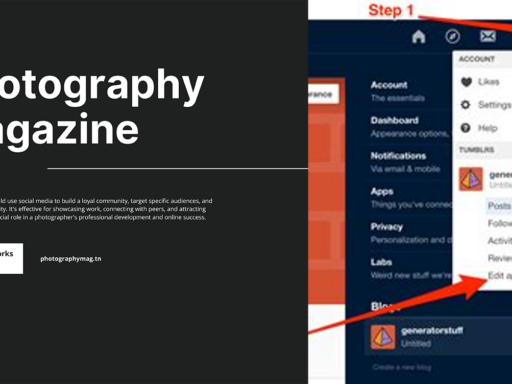Can Your ISP See Your Tumblr History? Let’s Dive In!
Ah, the mysterious world of the internet. One moment you’re minding your own business, scrolling through memes on Tumblr, and the next moment you start to wonder if Big Brother—otherwise known as your Internet Service Provider (ISP)—is peering over your digital shoulder. Can they really see what you’ve been up to? Specifically, can they see your Tumblr history? Buckle up; we’re about to go on a wild ride through the tangled web of internet privacy!
Understanding What Your ISP Can Actually See
First things first: your ISP can see all your internet browsing history. Yep, you heard that right! Whenever you connect to the internet, your ISP serves as your postman, delivering and collecting data packets from your device to various services online. Every time you click on a link, every time a page loads, your ISP watches and records that information.
But hang on—what exactly does that mean for your Tumblr adventures? Your ISP can observe the websites you visit, the times you’ve visited them, and even the amount of data you’ve consumed while lurking in the depths of those Tumblr tags. However, when it comes down to your Tumblr history—the *actual posts*, comments, and reblogs—you’re in the clear! Your ISP cannot see what you do while you’re on Tumblr for one very important reason: they don’t have access to private content within websites.
What’s Up with Browsing vs. Search History?
Let’s clarify a few terms to make sure we’re all on the same page. When we talk about browsing history, we’re referring to the websites you’ve visited. Think of it as a digital breadcrumb trail that leads back to all the corners of the internet you’ve explored. On the flip side, search history lists your search queries submitted to search engines like Google, Bing, or DuckDuckGo. These are more like your inner thoughts about what you’re hunting for online, and thankfully, ISPs don’t have access to that.
The Catch: If you’re using a shared or public computer, you best believe that dangers lurk! If you forget to log out of your accounts, clear your search history, or, at the very least, opt for Incognito mode, someone sitting down after you could gather information on what you’ve been searching for. So, if you’re secretly trying to figure out how to break dance for your next TikTok post and forget to clear your tracks, don’t say I didn’t warn you!
The Illusion of Privacy on Platforms Like Tumblr
Now, let’s dig deeper into Tumblr. This platform is known for its eclectic mix of fandoms, memes, and a whole lot of quirky content. When you log on and start looking around, Tumblr will keep some records of your interactions on the site—like reblogs, follows, and replies. But here’s the juicy part: These are stored on Tumblr’s servers, and your ISP cannot snoop on that data.
Using Tumblr means that the only eyes on your activity will be Tumblr’s, and even then, they only have access to your content as long as you don’t set your blog to private. If you want to restrict prying eyes—whether they’re fellow users or your ISP—consider making your blog private or password-protecting certain posts that you hold dear.
Encryption and Privacy: Your Secret Weapons
In the ever-evolving world of technology, there’s one handy trick that empowers users to protect their online activity—encryption! When you enable encryption (like when using HTTPS), it scrambles your data, making it difficult for anyone else, including your ISP, to decipher it. So, here’s a fun tip: your web browser will typically automatically default to this more secure setting, especially with the rise in online privacy awareness. This means that even if your ISP knows you’re wandering around Tumblr, they won’t have a clue about the specifics of what you’re doing while you’re there.
Private Browsing and VPNs
If you’re overly cautious—or just really want to keep your Tumblr escapades a secret from both your ISP and your nosy roommate—consider taking it up a notch with VPNs (Virtual Private Networks). Think of a VPN as your very own invisibility cloak. By creating a private connection to the internet, VPNs hide your IP address and encrypt your data, creating a digital fortress where your online activity feels secure.
I mean, why not add a bit of flair to your internet life? With a VPN, you can browse the web like nobody’s watching while scrolling through delightful cat gifs and conspiracy theories about socks disappearing in the dryer. Not that I’m judging any of those activities!
What Can Your ISP See? The Breakdown!
| Browser Activity | What They Can See |
|---|---|
| URLs Visited | Yes! Your ISP sees all the domains you visit, including Tumblr. |
| Data Usage | Yes! They monitor how much data you consume, which varies with different sites. |
| Time Spent on Each Site | Yes! ISPs track how long you spend browsing each website. |
| Specific Search Terms | No! Your Google or search engine queries remain private. |
| Account Login Details | No! They can’t access your logins for Tumblr or any other site, just the fact that you connected. |
Browsing Without Worry – Tips for Maximum Privacy
So, you want to keep your Tumblr history as secret as your favorite *embarrassing* playlist on Spotify? Here are some more tips to maintain online privacy:
- Clear Your Cookies: Regularly clear your cookies; those little buggers can reveal browsing habits.
- Use Ad Blockers: These nifty tools help obscure tracking ads that can spill your secrets.
- Incognito Mode: Use this feature when sharing public machines to eliminate residual history.
- Secure Your Network: Use strong Wi-Fi passwords. Public Wi-Fi can be a dumpster fire for security, so watch out.
- Consider a Privacy Browser: Brave or Tor can help keep your online activities hidden from prying eyes.
In Conclusion: Stay Playful, Stay Private
In conclusion, your ISP can see your internet browsing history, including your hopscotch leaps across your favorite corners of Tumblr. However, they cannot see your inner thoughts captured in your search history. So, continue to dive into the world of memes, fandoms, and artistic expressions without worries of judgment (well, except from your friends). Just remember to take some online privacy precautions, and you’ll be ready to hum along to your conspiracy sock playlist in peace!
With all this knowledge at your disposal, you can now roam freely on Tumblr, knowing that, while your ISP may witness your dance moves, your search for information about those dance moves will stay your little secret. Happy browsing!





